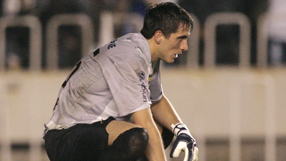Violence still engrained in Argentine game
BUENOS AIRES - Racing Club goalkeeper Pablo Migliore acted as if nothing unusual had happened during a recent morning training session. "We understand that the supporters are angry," he said. "We ask them to support us because we need to be together to get out of this situation.

"We've only taken three points from the last 30 and the players know that we are not doing things right. The opponents can win by playing better than you but not because they run more."
They were typical, run-of-the-mill comments from a player reluctantly facing the microphones.
Yet, it had been a far from normal morning at Racing, one of Argentina's most popular clubs and one of its most troubled.
The team had arrived to find threatening messages daubed in the street leading to the training ground. The most sinister read: "There are going to be bullets for everyone".
When the team came out to start practice, a group of around 15 men belonging to the club's hardcore group of fans demanded to speak to the players.
Migliore and Franco Sosa agreed to meet them but despite the climate of intimidation the goalkeeper gave the impression that the incident was a friendly chat.
"The supporters made us aware of their worries and their anger about the situation the team is in," he said. "And we asked for their support."
Get FourFourTwo Newsletter
The best features, fun and footballing quizzes, straight to your inbox every week.
Many were shocked at the laid-back manner in which Migliore spoke of the incident.
Others said his reaction reflected the extent to which threats and violence have become part and parcel of Argentine soccer.
"A Racing player publicly judged that the threats were 'normal'," said La Nacion newspaper in an editorial.
"The impunity has reached such a degree that it seems they (the fans) are convinced that there are now no moral or institutional brakes on their behaviour."
IMMIGRANTS INSULTED
Argentine football suffers from chronic violence often blamed on organised supporters' groups called 'barras bravas'.
Traditionally, they have enjoyed a close relationship with the clubs, receiving free tickets and subsidised travel to away games.
Many groups are split into factions who fight sometimes amongst themselves and often side with club directors in internal political disputes.
Dutch security expert Otto Adang said European-style solutions to hooliganism would not work in Argentina.
"I'm shocked at the connections that the barras have with power," he said in an interview with the sports daily Ole.
"The European solution in Argentina is impractical. In Europe, the hooligans are concentrated in marginal groups with no relation to the system. Here, they are connected to a surprising extent."
A day before the threats to Racing's squad, more violence broke out.
Television pictures showed dozens of Boca Juniors fans fighting with police and among themselves before the game against Independiente, apparently angry that one supporter had been prevented from taking a gun into the stadium.
The same match produced an international protest when Independi
